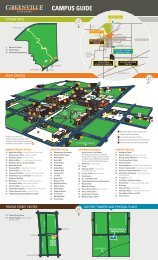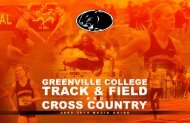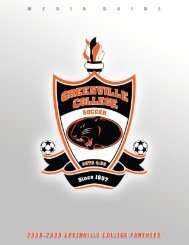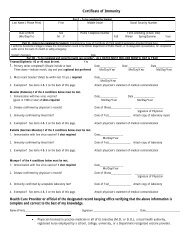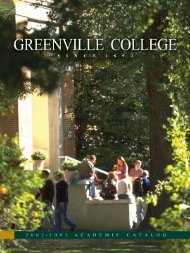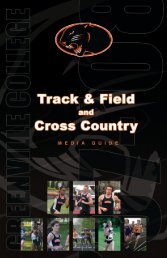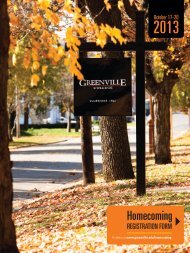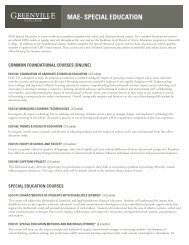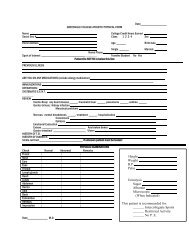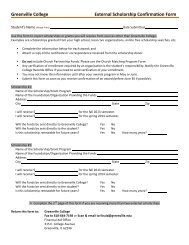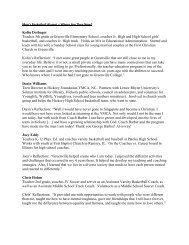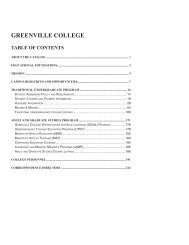2012-2014 UndergraduateCatalog.pdf - Greenville College
2012-2014 UndergraduateCatalog.pdf - Greenville College
2012-2014 UndergraduateCatalog.pdf - Greenville College
Create successful ePaper yourself
Turn your PDF publications into a flip-book with our unique Google optimized e-Paper software.
GENERAL EDUCATION<br />
Core Requirements: Core courses are fundamental to the Christian liberal arts focus of <strong>Greenville</strong><br />
<strong>College</strong>. Most students are required to take four Core courses. These include:<br />
• COR 101 Cornerstone Seminar: Foundations in the Liberal Arts Tradition (3 credits)<br />
• COR 102 Introduction to Christian Thought and Life (3 credits)<br />
• COR 302 Science and Christianity (3 credits)<br />
• COR 401 Capstone Seminar: Advanced Integrative Studies (2 credits).<br />
Transfer students who arrive at <strong>Greenville</strong> <strong>College</strong> with 60 or more credits or an A.A., A.S., or<br />
A.A.T. degree are exempt from taking COR 101 and COR 102. However, these transfer students<br />
still must take COR 302 and COR 401. Their first fall semester on campus they must also take<br />
COR 301: Liberal Arts and Christian Thought (3 credits). The exception is students who have<br />
an Associate’s degree and have graduated from high school within nine months of being enrolled at<br />
GC will be scheduled to take COR 101T their first term, and will proceed to complete the COR<br />
sequence listed above including COR 102, COR 302, and COR 401 in subsequent terms. Any<br />
transfer student beginning at GC in the spring semester will complete all four COR courses listed<br />
above.<br />
Distributed Requirements: Distributed courses help students develop skills such as critical<br />
thinking and provide students with introductions to the humanities, natural sciences, social<br />
sciences, and physical fitness.<br />
Required Courses: The faculty requires most students to take five specific general education courses<br />
in addition to the Core. These include:<br />
• COM 101 Speech Communication (3 credits)<br />
• ENG 105 Research and Writing (3 credits)<br />
• HPR 101 Wellness: Basic Concepts (1 credit)<br />
• HPR 102 Wellness: Physical Fitness (1 credit)<br />
• HST 101 Western Civilization (3 credits).<br />
Students arriving on campus with an A.A., A.S., or A.A.T. degree are not required to take these<br />
courses. B.M.E. students are not required to take HPR 102 but must take all others.<br />
Required Areas of Study: Students are required to study in a number of additional areas in order to<br />
complete their general education requirements. These are areas of study as opposed to specifically<br />
required courses. In each of these areas, students may choose among a number of different course<br />
options. These are listed by area below.<br />
Biblical Studies<br />
All students, except those entering with an A.A., A.S., or A.A.T degree, must complete the<br />
Biblical Studies requirement. They may do so by taking any three credit course designated<br />
as a Biblical Studies course, (a course that focuses on a particular Biblical genre, book,<br />
or testament of the Bible). The prerequisite for Biblical Studies courses is COR 102.<br />
Currently, the following courses can meet this requirement:<br />
• BIB 205 Old Testament Survey<br />
• BIB 215 New Testament Survey<br />
• BIB 270 Wisdom and Poetic Literature of the Old Testament<br />
• BIB 321 Pentateuch<br />
• BIB 322 Prophets<br />
• BIB 352 Pauline Epistles<br />
• BIB 353 Synoptic Gospels<br />
Other courses (such as BIB 199 or 399 open titled courses) may also fulfill the Biblical<br />
Studies requirement. Students interested in these alternative courses should check with the<br />
chair of the Department of Philosophy and Religion or the Records Office to ensure that<br />
proposed courses will fulfill the Biblical Studies requirement.<br />
Cross Cultural Course or Experience<br />
All students must complete a cross cultural (CC) course or experience. Either a CC course<br />
34 | <strong>2012</strong> - <strong>2014</strong> ACADEMIC CATALOG



